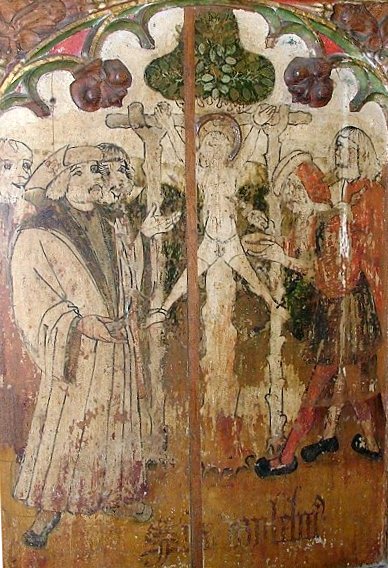 |
| Crucifixion of William of Norwich, Holy Trinity church, Loddon, Norfolk |
Here's a very grim piece on the "blood libel" myth and how it's being used today.
As detailed in the article, it's a medieval myth that Jews murder children and use their blood to bake into matzoh. It's often been used to justify violence against Jews over the centuries, after it emerged in medieval Norwich. I remember teaching the myth to my students once and their response was, "oh my god, this is true!" I quickly told them no, but somehow it seemed plausible to some. It's had a kind of power that resonates far, far, beyond its original context, being twisted and re-used for each new moment in which hatred of the Jews seems useful.
I was distressed to read the following [my emphasis]:
Last week a video of Hamas spokesman Osama Hamdan emerged in which he claimed that Jews use the blood of non-Jewish children to make matzo for Passover.
The translation of Hamdan’s interview with the Lebanese television station Al-Quds on July 28 reports him as saying:
"We all remember how the Jews used to slaughter Christians, in order to mix their blood in their holy matzos. This is not a figment of imagination or something taken from a film. It is a fact, acknowledged by their own books and by historical evidence. It happened everywhere, here and there."
When confronted about his statements by CNN's Wolf Blitzer on Monday, Hamdan did not retract his claim or distance himself from the blood libel slur. His only defense was that he “has Jewish friends."So there's the blood libel, presented as simple fact. I wouldn't be surprised if this spokesman is also a Holocaust denier, as that tends to go with the other positions as well, but I don't know.
The thing that is undeniably true in his statement, though, is that many people do remember the blood libel. Memory lies, moves, shifts, warps, twists, reshapes, and emerges again at unexpected moments. People remember and they believe that what they remember must be true. And of course, from "remember" to "fact" on a station called al Quds, the Arabic name for Jerusalem, and today a name that symbolizes the Islamic claim to ownership over the city.
Sure, Hamdan might be lying just to score rhetorical points on Lebanese television, but at least some of the people to whom he speaks will not know that, or will not want to know that. They will believe because believing works for them at this time.
I am very critical of the Israeli assault on Gaza. I don't want that critique, however, to override the awfulness of antisemitism or the way that Hamas, already a organization dedicated to hate, is using this moment to intensify the hatred of the Jews in the region and the world.
These are dangerous times. Here's what Ross and Baden write:
As Osama al-Baz, an adviser to former Egyptian President Hosni Mubarak, observed in 2013, some “Arab writers and media figures … attack Jews on the basis of … racist fallacies and myths that originated in Europe.”
Hamas may be doing no more than repeating tired cultural clichés and long-debunked slander, but myth and action go together. The history of Europe is a testimony to the devastating power of the blood libel.
People and cultures are defined by the myths they create, but also by the myths they accept and propagate.From myth to action. Obviously, actions matter a lot. But the stories we tell, the myths we create and spread, they have intense power to motivate us for good and for ill.
And in the story of the blood libel, no one gets out alive.
